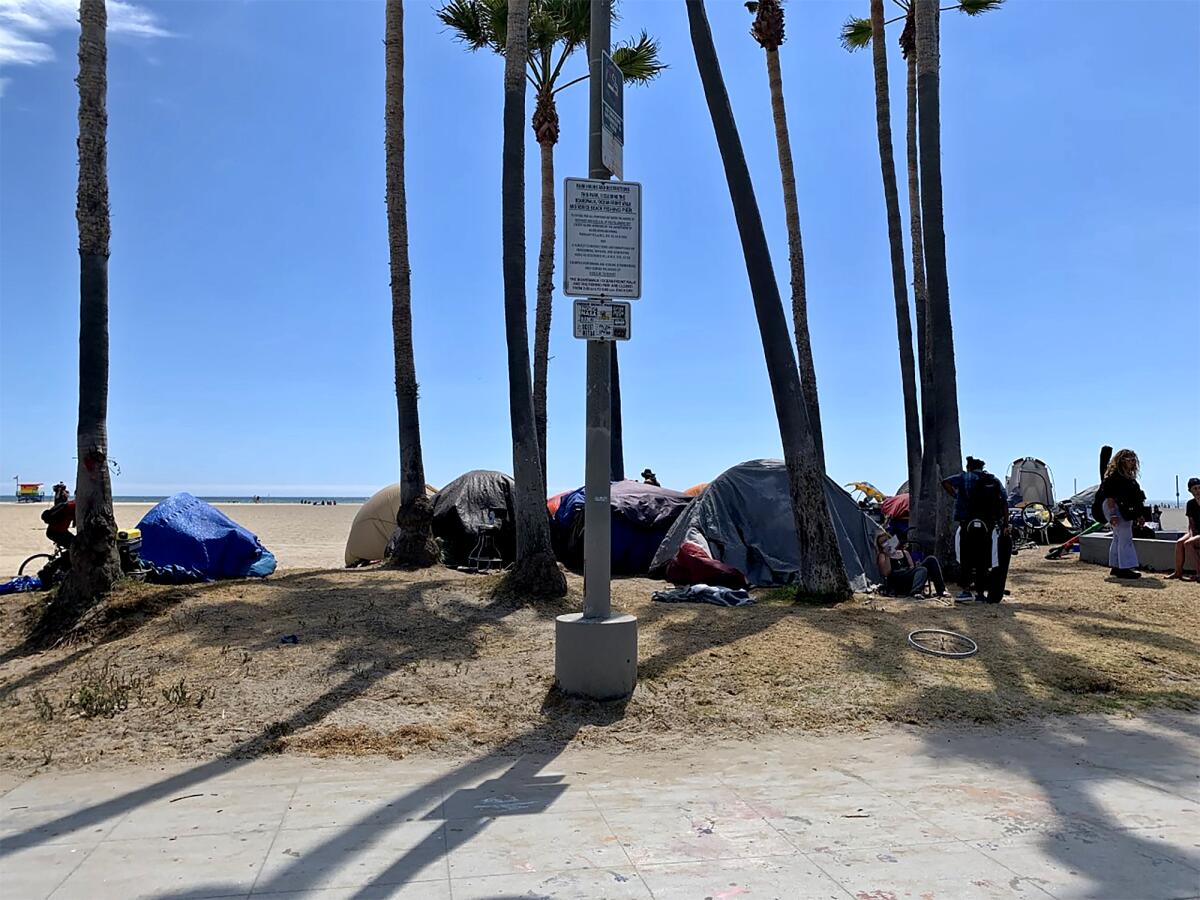Anti-camping laws tell homeless people where they can’t sleep. So where can they sleep?

- Share via
I don’t think the Los Angeles City Council’s new anti-camping ordinance is a knee-jerk, hide-the-homeless-people move. I think it was a desperate attempt to show constituents that council members heard their complaints about the profusion of tents on sidewalks.
They do seem to realize an ordinance forbidding camping near schools, daycare centers, fire hydrants and designated areas of neighborhoods will not solve homelessness. Two days before the vote, the council also passed a motion containing a resolution, largely crafted by Councilmember Mark Ridley-Thomas, to create and implement an extensive street outreach effort to get homeless people into housing or shelter — or begin that process — ahead of the anti-camping rules taking effect.
Here’s the problem: There are an estimated 41,000 homeless people in L.A. And even with current efforts across council districts to find motel and hotel rooms, to build permanent housing and set up tiny villages, there is still not enough shelter or housing. That means no matter how well the ordinance gets enforced, homeless people will simply be pushed around town, from one neighborhood to another. Initially, the ordinance would have made any violation of the rules punishable as a misdemeanor. Ridley-Thomas persuaded the council to amend the ordinance to make it a misdemeanor only if a homeless camper in an off-limits area refuses to comply with an order to leave. But a person who does leave willingly could still be slapped with an infraction — and a fine — for being there in the first place. Why make it an infraction at all?
Councilmembers Mike Bonin and Nithia Raman were the only ones to vote against the anti-camping ordinance. I call that compassionate. I imagine their colleagues and probably some of their constituents would call it foolish. Even if you disagree with how they voted, it’s worth listening to what Bonin had to say about why he voted against it — and how it feels to be homeless, because he once was.
“What we are doing today tells people that are unhoused and have no place to go where they cannot sleep. But it does not tell them where they can sleep,” he said.
Bonin is a recovering alcoholic and addict — a fact of his life he has shared.
“What I don’t share as openly is my experience being unhoused,” he said. “I didn’t live in an encampment but I literally had no place to live. For periods of time I did not have in my 20s in Los Angeles a home.” Sometimes he couch-surfed or stayed in a crappy motel or slept in his car. And sometimes he had no place to turn but outside.
“I cannot tell you how much turmoil there is in your heart when the sun is setting and you don’t know where you can sleep,” Bonin told his colleagues. “I cannot tell you how demoralizing and dehumanizing and defeating that experience is when you don’t know where you are going to sleep. I cannot adequately express the combination of shame and frustration and anger and desperation and confusion you feel in that moment. And that’s why I keep asking again and again: Where can people sleep?”
Bonin did not contest the council’s decision on the types of locations identified as off-limits. “All those are reasonable places to say people can’t sleep,” he said. But he noted that it just makes it harder for homeless people to know where they can sleep.
“My lived experience teaches me that we are all fragile, that we are all breakable and often break and we all stumble and fall down and need someone to help us up,” he said to the council. “I believe deep in my heart that every member wants to help people up, but telling people where they cannot sit, sleep or lie does not help them, does not tell them how to get back up.”
This is the work the council has to do: find or create more housing or shelter that offers people a modicum of privacy and security. Then council members can mark off all the places homeless people cannot sleep.
More to Read
A cure for the common opinion
Get thought-provoking perspectives with our weekly newsletter.
You may occasionally receive promotional content from the Los Angeles Times.










